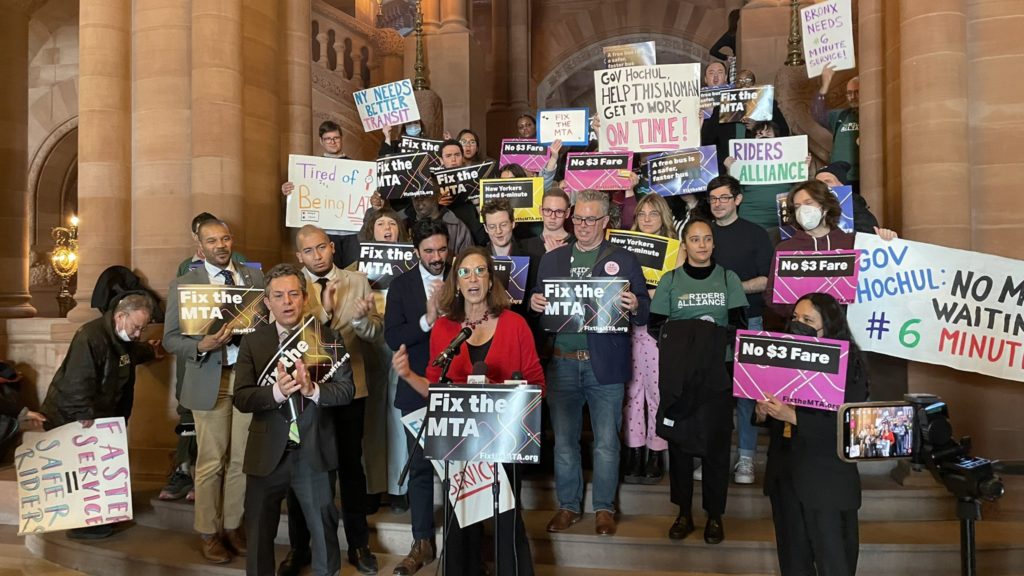PCAC rallied in Albany to show support for key provisions of the Fix the MTA Package. The MTA is facing a huge deficit that, if not addressed, will lead to devastating cuts in bus, subway, and rail service and/or crippling fare increases – any of which would significantly hinder the return of riders to transit and have far-reaching negative consequences for the regional economy and for riders themselves. Ensuring that there is sufficient, dedicated and ongoing operating aid for the MTA is our number one priority. We enthusiastically call on our state leaders to seek ways to fully fund transit in the final budget in a way that is sustainable beyond the farebox and not susceptible to raids for the general fund or other uses. Transit is an essential service and it’s time to fund it as such.
Given the looming fiscal crisis, now is the time to not only fill the deficit but bring greater funding for reliability, efficiency, accountability and affordability to the MTA.
We need to fill the deficit, while passing further reforms to ensure the MTA is accountable, efficient and fiscally secure; the plan proposed seeks to provide stable and steady operational funding for transit and comprehensive reforms to the Authority.
We particularly wish to highlight the following:
Ensuring rider perspectives have votes on the MTA Board (Gounardes S00020/Dinowitz A00923)
We’re particularly excited about Senator Gounardes and Assemblymember Dinowitz’s legislation to give riders a voting seat on the MTA Board. It’s important that the Board members who vote make decisions about the future of the MTA have riders’ best interests in mind—that means they should ride transit and have a deep level of understanding of the issues that face riders every day. This bill would do just that, by giving a vote and much stronger voice to the existing MTA Board representatives from the New York City Transit Riders Council (NYCTRC), Long Island Rail Road Commuter Council (LIRRCC), and Metro-North Railroad Commuter Council (MNRCC). PCAC’s three rider councils have a legacy of advocating for improvements that have helped riders around the MTA region since the financial crisis of the 1970s, but their MTA Board representatives currently do not have a vote. This vital legislation would also give Access-A-Ride users a voice on the MTA Board for the first time— crucial at a time when only 25% of subway stations are currently accessible, although many more are in the works. Taken together, the four new voting MTA Board members representing regular users of NYC Transit, LIRR, Metro-North, and Access-A-Ride are critical to creating an MTA and transit system for riders, by riders, and with riders.
Bus lane enforcement (Krueger S00153 / Hyndman A02610)
Relating to Automated Bus Lane Enforcement (ABLE) – Our bus network currently has some of the slowest speeds in the nation, and improvements like bus lanes will help—but only if cars get out of the way. ABLE will help the MTA keep buses and their many riders moving: the cost of slow buses, according to the Citizens Budget Commission, is $268 million— the estimated amount the MTA could save by speeding up buses by 15%; but the dollar amount for time saving for riders is almost incalculable.
Utility relocation (Comrie S4415/Mamdani A4035)
We support legislation in the Fix the MTA package to improve the MTA’s efficiency, including Senator Comrie and Assemblymember Mamdani’s bill to speed up the MTA’s construction processes through streamlining utility relocations. Improving the construction process is key to building, fixing, and maintaining the transit system at a time with major capital projects in the works, and this bill is a common-sense measure to help the MTA get work done for riders.
Capital projects reporting requirements (Ramos S3545/Carroll A04043)
Legislation to improve transparency is important to ensuring that advocates, riders, and elected officials can hold the MTA accountable. This bill, which would strengthen reporting requirements for capital projects, would make a big difference to providing clarity. Currently, it’s hard to understand project timelines, purposes, and budgets through the MTA’s Capital Program Dashboard. Improvements as simple as requiring the dashboard to state whether projects are resiliency or accessibility improvements, where funding comes from, and whether there are delays would help all stakeholders hold the MTA responsible, which can be hard to do without clear, updated information on the many exciting, but often confusing, projects in the works.
Enabling the MTA to engage in value capture (Comrie S4417/Mamdani TBD)
By making the existing law that allows the MTA and City of New York to come to agreement to establish a value capture process permanent, additional value that is created by the added value from transit would be recouped and poured back into the system. Those who live near transit benefit from its proximity; a monetary value for the benefit should be determined so that the transit system can continue to support the surrounding riders.
Remitting the internet marketplace sales tax (Gounardes S01205/González-Rojas A2895)
Remitting the Internet Marketplace Sales Tax directly to the MTA will help ensure that the anticipated $329 million revenue in 2023 that is intended for the central business lock box is made without appropriation so that it is not diverted for other purposes.
Now is the time to Fix the MTA, address its MTA deficit and put it on sound fiscal footing for the future. Transit is an essential service and must be treated as such, recognizing that it is the economic engine of the New York region, and the entire northeast. We are calling on the State Legislature and Governor Hochul to step in and Fix the MTA—the economic backbone of our state, city, and region—for the millions of riders who depend on it.
